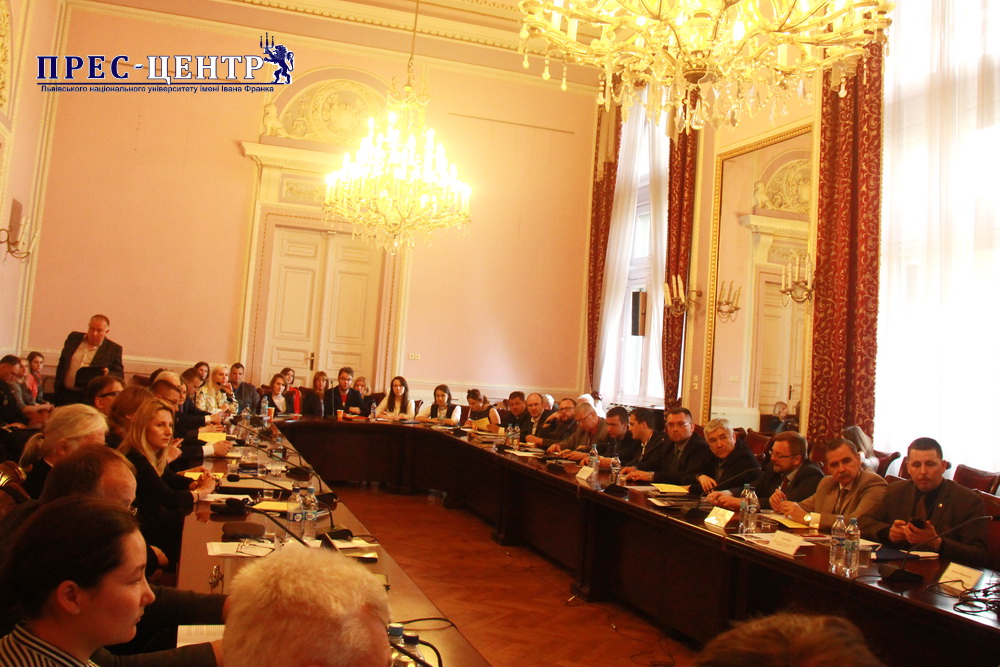
Opening ceremony of the International Scientific Conference “Ukraine in Terms of Transformation of the International Security System” took place in the Mirror Hall of Ivan Franko National University of Lviv on May 23, 2017.
The participants of the scientific conference were welcomed by the Rector, Professor Volodymyr Melnyk, who, in particular, focused on the importance of university education and science in international relations. According to the Rector, one of the main features of a true European University is the ability to respond to challenges, including issues of security protection.
“The problem of security is the challenge for the scientific community, which should facilitate the search for new innovative approaches and principles of transformation of the security environment in the world”, said Volodymyr Melnyk, adding that now “the power of authority is replaced by the authority of power – the military, economic, sanction and political”.
The Rector of the University is convinced that “it is only collective security based on bringing together leading European countries that will enable to efficiently deal with problematic issues, to build a truly European home that will fit the classic sense of security, tolerance and intercultural communication”.
The floor also went to the first Deputy Head of Lviv Regional State Administration Rostyslav Zamlynskyi who said that the challenges faced by Ukraine are also to be met around the world. “Thanks to the Ukrainian army and the unity of civilized world community we managed to stop Russian aggression. The first steps towards a common struggle for democratic values against authoritarianism and aggression have united us with the world”, said Rostyslav Zamlynskyi.
In addition, Rostyslav Zamlynskyi expressed confidence that today it is quite essential to develop a joint approach to stabilizing the situation in Europe. “The position of the academic community is important for providing the security environment in Ukraine and the EU”.
Deputy Mayor of Lviv Andriy Moskalenko stressed on the inadmissibility of leveling the priority of security issues. According to him, government agencies, educational institutions and the public must make efforts in order to “change the behavioral pattern of each person” and establish a secure environment as a priority of domestic and foreign policy.
Consul General of the Consulate General of Poland in Lviv Rafał Wolski assured that his country fully supports Ukraine in its fight against the external aggressor.
“We seek to support the European integration of Ukraine as your state is our preferred partner and an important neighbor on the east border. European integration of Ukraine will add to the expansion of European security, which is subject to many transformations and challenges”, said Rafał Wolski.
Petr Pojman from the Prague Security Studies Institute spoke about the Czech Republic support of the European vector of Ukraine. In particular, he drew attention to numerous programs aimed at improving various spheres of life in Ukraine.
Outlining the current situation in the security environment, the Member of the Senate of Poland, Minister of National Defense of Poland (2007 – 2011) Bogdan Klich stressed the importance of stabilizing the situation in Ukraine. “There can’t be safe Poland without as well as it is difficult to imagine an independent Ukraine without secure Poland”, said the former minister.
On the critical importance of academic debate in terms of transformation of the international security system dwelled the Director of the Institute of International Studies, University of Wroclaw (Poland) Zdzisław Julian Winnicki. In particular, he noted an ongoing struggle for freedom and values, in which scientists and young people play a key role.
Head of the Foreign Ministry of Ukraine in Lviv Vyacheslav Voynarovskyi pointed out that elements of the modern hybrid warfare waged against Ukraine became information, religion, migration, culture, and more. Hence, it is necessary to develop a broad discussion on strengthening security environment.
Director of the Foreign Policy Institute of the Diplomatic Academy of Ukraine, Professor Hryhoryi Perepelytsya said: “Today we recognize the challenges and prospects of Ukraine’s integration into the EU. Challenges that faced the whole of Europe are related to the transformation of the international security system. After all, these transformations always open not only prospects but also some threats to our development. Today our task is to analyze the transformation processes, assess their further development and find ways to neutralize these major threats”.
Extraordinary and Plenipotentiary Ambassador of Ukraine, Dean of the Faculty of International Relations, Professor Markiyan Malskyi thanked those present for participation in the conference. He stressed that “the conference is an important step towards understanding international relations and the achievements of effective ways to improve the security environment in Ukraine and Europe.
Further, the participants discussed the security dimension of Ukrainian-Polish strategic partnership, the current state of international relations, Euro-Atlantic security system after the Russian aggression in Ukraine, the Russian-Ukrainian conflict as a factor in the modern transformation of the security and other important issues of security environment in Ukraine and the world.
Special attention the scholars paid to the analysis Donald Trump’s policy, as well as challenges and prospects that are associated with it. In addition, participants analyzed the methods and effects of hybrid warfare waged by Russia against Ukraine and international political dimension of possible models of the Russian-Ukrainian armed conflict resolution.
After the plenary session the conference continued its work in sections: “Ukraine – Russia: from Strategic Partnership to War”, “Political, Legal and Practical Aspects of International Security” and “Applied Research Questions of International Relations and Security Studies”.